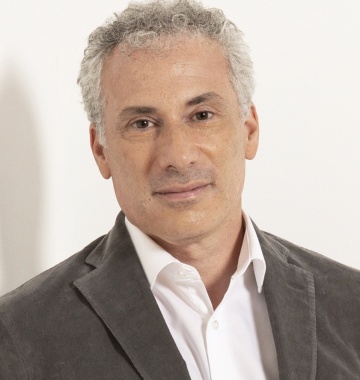Columbia College | Columbia University in the City of New York
MoMA’s Josh Siegel ’92 Forged Unbreakable Bonds on Carman 9

PETER ROSS
He is also the co-editor and author of Frederick Wiseman and Modern Contemporary: Art at MoMA Since 1980, and the monographs Baby, It’s Cold Outside: A History of Finnish Cinema and The Łodź Film School of Poland: 50 Years. He serves on the executive boards of MacDowell, Light Industry, Cinema Tropical and the Maurice Sendak Foundation; has lectured widely; served on grant panels for the National Endowment of the Arts and others; and been a jury member of many international film festivals, including Venice, Dublin, Cartagena and Vancouver.
What were you like when you arrived at Columbia?
Quite nerdy and quite prepared to reinvent myself. One of my friends/archrivals at my high school, Columbia Prep, came up with the neologism “Siegelian” to describe anyone who did twice the amount of work and got half as much done. He went on to become the head of NBC — for a hot moment — and had caged tigers at his house party in Malibu so I didn’t place too much stock in his opinions. But at Columbia proper I did retain my Jewish work ethic while also forging much deeper friendships with a far more diverse, eclectic — and loving — group of people.
What do you remember about your first-year living situation?
I hit the jackpot. I still pinch myself. Carman 9 in 1988–89 was legendary, even in its own time. Lots of hugs, lots of pranks, lots of dating, lots of late-night hanging out and blasting of Prince, R.E.M., Public Enemy, Violent Femmes, Gun N’ Roses and Madonna (pace Milli Vanilli). My roommate, David Goldberg ’92, is still one of my dearest friends, as are three other floormates, and I’m still in touch with 20 of the 40-odd people who were thrown together that year. Our bond is unbreakable.
What Core class or experience do you most remember, and why?
I’m Core to the core. I went to Columbia Prep — a school whose great claim to fame, at least at that point, was having kicked out Herman Melville in the 19th century, so they obviously knew talent when they saw it — and this meant I had already read a great many foundational Western texts, from Plato, Virgil and Catullus to Shakespeare, Freud and Woolf. Multiculturalism was the byword of the day so there was a burgeoning effort at the College to reassess and diversify the canon; still inchoate in its methods and aims, and nothing like the debates that impassion — and sadly inflame — campuses today, but this meant my appreciation of literature, history, politics, music and art became much more worldly.
It was at Columbia that I discovered the medieval Persian mystical poet Rumi, the Japanese novelist Jun'ichirō Tanizaki, the anti-colonialist thinking of the Martinique philosopher Frantz Fanon, and the “poems, protests, and dreams” of Sor Juana Inés de la Cruz, a 17th-century Mexican nun. As I write this, my nightstand is piled high with books by Natalia Ginzburg, Idries Shah, Joseph Roth, Fran Ross, Nicholas Humphrey, Olga Tokarczuk, Darryl Pinckney ’88 and Ivan Turgenev, and I realize my tastes continue to gravitate toward serious literature and serious thinking. I suspect that’s the greatest legacy of my College experience. Fear not: I love trashy things as much as the next person. But my job requires me to watch so many movies — both high and low — that I somehow feel a steady diet of difficult art and difficult ideas keeps me both sane and humble about the many things I don’t know and the many things I’m wrong about.
Did you have a favorite spot on campus, and what did you like about it?
I miss combing the stacks of Butler Library without a clear destination in mind. I liked that possibility, before the dictates of internet browser algorithms, of serendipitous discoveries thanks to seemingly random juxtapositions of books. The logic of the Dewey Decimal System was lost on me, maybe because I was intoxicated by the smell of dust and disoriented by the sudden darkness into which I was plunged when the timers on those ghastly, humming fluorescent lights would run out.
Oh, and as an emeritus of the now-banned Marching Band, notorious for obscene gestures on the playing fields of Yale and Harvard and for the theft of gigantic traffic signs on the New Jersey Turnpike, I miss the raucous bus trips that would take us to yet another football loss. The best party at Columbia erupted when the Lions broke the NCAA’s longest losing streak by beating Princeton. I realize our fortunes have since risen on the gridiron, though perhaps not yet to the heights of the first Rose Bowl or the days of Sid Luckman ’39.
What, if anything, about your College experience would you do over?
There was a running joke that few students ever ventured south of 110th Street or north of 125th. I’m a native Upper West Sider, so growing up I went to my share of downtown bars and clubs, including CBGB to see The Ramones, Talking Heads and Blondie, but I do regret the countless concerts, plays and dance performances I passed up because I was studying excessively for an exam. Never to have seen Prince or the Beastie Boys still makes me wince. Now that I think about it, maybe “Siegelian” isn’t inapt after all.

